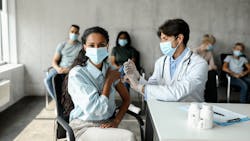GW School of Medicine and Health Sciences and the GW MFA recruiting participants for final stage of the NIAID’s COVAIL trial
The GW School of Medicine and Health Sciences is recruiting participants for the final stage of a clinical trial to evaluate two Omicron-specific vaccines.
The study, known as the COVID-19 Variant Immunologic Landscape (COVAIL) trial, is sponsored by the National Institute of Allergy and Infectious Diseases (NIAID), part of the National Institutes of Health (NIH). The George Washington University School of Medicine and Health Sciences has received funding support as an agreement under NIH contract number 75N91019D00024 to Leidos Biomedical Research in Frederick, Maryland.
Back in April, The GW School of Medicine and Health Sciences was selected to serve as one of 24 participating sites for the Phase 2 clinical trial to evaluate additional COVID-19 booster shots in adults, including multiple vaccines based on viral variants such as Delta and Omicron. The trial aims to understand if different vaccine regimens – prototype and variant vaccines alone and in combinations – can broaden immune responses in adults who already have received a primary vaccination series and a first booster shot.
Researchers at GW, led by David Diemert, MD, professor of Medicine and of Microbiology, Immunology, and Tropical Medicine at the GW School of Medicine and Health Sciences (SMHS) and a physician in the Division of Infectious Diseases at The GW Medical Faculty Associates (MFA), are conducting the clinical trial to help prepare for the possibility of future variants evading protection from currently available COVID-19 vaccines.
The COVAIL trial will gather data on the immune responses induced by prototype vaccines and variant vaccine candidates—including bivalent vaccines, which target two SARS-CoV-2 variants—to inform booster shot recommendations.
Most participants will attend 8 or 9 in-person study visits, including an initial screening visit (which may be combined with the first study vaccination visit), one study vaccination visit, and 7 in-person follow-up visits. The participants will be in the study for up to approximately 13 months, if they have a separate screening visit, or 12 months, if the screening visit is combined with the first study vaccination visit.

